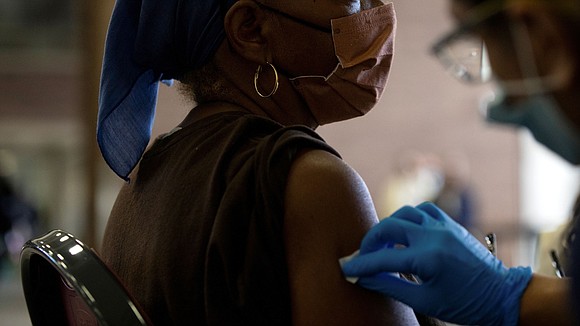Booster shots could soon be recommended for people as young as 40, source says
CNN/Stylemagazine.com Newswire | 10/20/2021, 11:49 a.m.

Originally Published: 20 OCT 21 02:16 ET
Updated: 20 OCT 21 06:58 ET
By Madeline Holcombe, CNN
(CNN) -- Booster protection in the US could soon expand to a much broader population, as a source says the US government likely will soon recommend them to people as young as 40 who received either Moderna or Pfizer's Covid-19 vaccine.
"I believe it will happen," the source familiar with the plan told CNN's Elizabeth Cohen, adding that there is "growing concern within the FDA" that US data is beginning to show more hospitalizations among people under age 65 who have been fully vaccinated.
Last month, the US Food and Drug Administration (FDA) authorized booster shots for people age 65 and older who received their second shot of Pfizer's vaccine at least six months ago. For younger people, the booster is authorized only for certain groups, such as those with certain health conditions or those working in jobs that put them at high risk for contracting Covid-19.
Although boosters for Moderna have not yet been granted authorization, a panel of advisers to the FDA recommended last week that Moderna be given the same rules as Pfizer's boosters. They also recommended people of all ages who received a Johnson & Johnson vaccine get a booster, which also awaits authorization, two months after their original shot.
If the FDA eventually backs lowering the age for boosters, the plan would then go to the US Centers for Disease Control and Prevention (CDC) for its sign off. Vaccine advisers to that agency are meeting this week to discuss Covid-19 booster shots.
As colder months approach, experts have warned that the best way to control the spread of Covid-19 is through vaccination. But there have been obstacles reaching the level of the vast majority of the population needed to be vaccinated.
"Yes, the vaccine does protect you, but (what) protects you even better is everyone around you is vaccinated," CNN Medical Analyst Dr. Leana Wen said this week. "We get vaccinated as healthy people in part to protect the most vulnerable among us."
Only 57.1% of the total US population is fully vaccinated, though there has been an uptick recently, with an average of more than 250,000 people initiating new vaccinations a day as of Tuesday -- the first time such a level was reached in the past week, according to data from the CDC.
And for vulnerable populations, experts have said a booster dose can be helpful in maintaining protection or reaching adequate levels for people who could not mount a sufficient immune response with their initial doses.
As soon as next week, the FDA is planning to announce that Americans can receive a different coronavirus vaccine for their booster shots than their original dose, according to two sources familiar with the current thinking inside the agency.
Numbers declining in children, but experts are still concerned
Rates of severe illness are lower in children than other age groups, but health officials still worry about pediatric infections.
While weekly case numbers continue to decline in children, 131,000 new cases were reported in the week ending Oct 14 -- "an extremely high number of newly diagnosed children," the American Academy of Pediatrics said Tuesday. Children represented 25.5% of weekly reported Covid-19 cases, the group found.
More than 1.1 million cases of coronavirus infection have been diagnosed in children over the past six weeks, the group said.
Cumulatively, 6,177,946 total child cases have been reported since the start of the pandemic and children have made up 16.4% of all cases.
"The available data indicate that COVID-19-associated hospitalization and death is uncommon in children," the group adds.
Children are also less likely than adults to become severely ill. Hospitalizations were reported in 24 states and New York City. Children accounted for anywhere between 1.6% and 4.2% of the total cumulative hospitalizations. Between 0.1% and 2.0% of all child cases resulted in hospitalization, the report said.
The CDC reports 691 children have died of Covid-19.
Currently, vaccines are only available to children as young as 12, but new data shows adolescents who get vaccinated are well protected.
The Pfizer/BioNTech vaccine is 93% effective in preventing hospitalization due to Covid-19 among children ages 12 to 18, according to a study released Tuesday by the CDC.
Schools try testing instead of isolating exposed students
Many students across the country are still not eligible to get vaccinated but are back in their classrooms -- leaving officials and experts to navigate keeping them safe in group settings.
Some schools have enforced strict quarantine and isolation policies for children who are exposed to the virus, but the CDC is working with select school districts across the nation to evaluate test-to-stay programs, which involve testing -- instead of quarantining -- students who may have been exposed to Covid-19 at school.
If the exposed students test negative and have no symptoms, they can continue going to school in person. If they test positive, they must isolate at home.
"In Marietta we have been tracking students who are testing positive through test-to-stay, and it's 3%," Grant Rivera, superintendent of Marietta City Schools in Georgia, told CNN on Monday.
"Three percent of our students who participate in test-to-stay test positive, which means we can keep 97% of them in class," Rivera said. "That is a measure of success."
Under a traditional quarantine program, the 97% of students who tested negative would still stay at home from school.
"I think for the foreseeable future, we will be out here every morning on a school day making sure that our kids have this option," Rivera said about test-to-stay.
The CDC notes on its website that test-to-stay may be a practice comprised of regular testing and contact tracing, but that's also while "maintaining other layered prevention strategies, such as universal masking, to reduce the spread of Covid-19."



